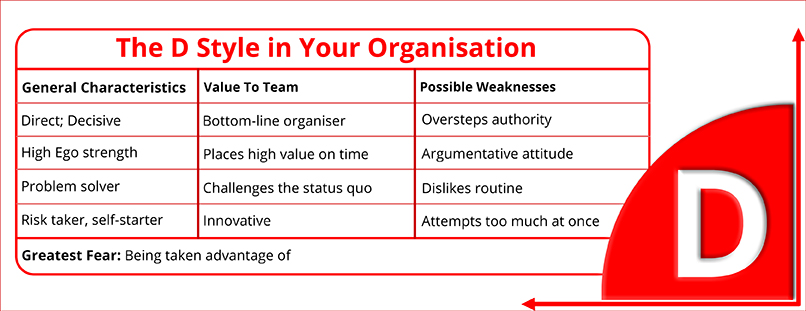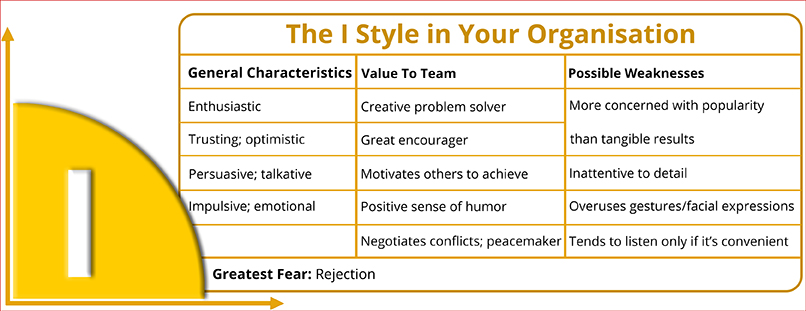Well, in truth, these often bring even more questions, as in my opinion it depends on:
• Who you are leading
• Who you are managing
• Who you are motivating
• What DISC styles are within your teams?
• What communication style will they respond to as a group and/or as individuals?
• What adaptations might you need to make as a leader to achieve this?
• Is your style of leadership congruent with the values and direction of the business?
• Do you know how your message lands to the team?
• Is this message being ‘delivered’ as you intended?
The bottom line is that any DISC style can lead. They will either change the role within the business to suit their style so that they ‘fit.’ Or they will be self aware enough to be a able to modify their natural style to adapt to the varying needs of the team, the business and the ups and downs of the economy.
The truth is, all DISC leadership styles display general characteristics, bring value to the team and potential have weaknesses that may need to be addressed. As such, to best understand the leadership styles of each personality – and which one is best for certain leadership roles, it helps to invert this question and understand where they might struggle.
Below I provide a snapshot of each DISC leadership style:
DISC & Leadership
Where do D-Style Leaders Struggle?

Although D-Style personalities are often drawn to leadership roles, their competitive nature and drive can put them at risk of becoming workaholics, which increases the risk of job burnout. They also tend to make decisions quickly - This is a virtue in many situations but this can be a problem if the D-Style leader takes action impulsively before weighing all of the consequences.
In a workplace environment, a D-Style leader often has difficulty communicating with more introverted personality types.
Conflict-adverse colleagues and subordinates of a D-Style leader might view the D personality as pushy and overly-aggressive and may well become less productive if this attitude makes them feel uncomfortable.
Where do I-Style Leaders Struggle?

People with a high I-Style often have a big personality and can crave the spotlight. They can also gain energy from interacting with those around them and can actively seek out the company of others. I personalities like to talk and can be outspoken and unlikely to keep their ideas and opinions to themselves. This is all very helpful but because leaders with an I personality like to talk, they can sometimes come across as poor listeners. An I’s natural optimism, too, can cause them to adopt a sunny outlook that dismisses or ignores real problems until it’s too late.
Leaders with an I personality can be very difficult for more introverted individuals to deal with. More Introvert styles (such as C personalities and S personalities) can find interacting with an I style leader to be draining and sometimes irritating and will often adopt strategies to avoid them during the day.
Also, leaders with an I personality generally speaking, like change and don’t crave routine or consistency, as a result, employees that thrive in a stable environment may be challenged by this. Similarly, because high I styles tend not to be schedule-driven, they can have difficulty with organisation and time management. Meeting and arranging deadline-sensitive projects may be difficult for them. I style leaders are often at their best when partnered with others with a more methodical style.
So, how do I know what sort of leader I am?
How do I know what DISC my team is?
Want to learn more about the power of DISC Profiling and enhance your people and communication skills? Join us for a one-day DISC Certification Workshop.
Limited places and Early Bird Offer available.

The Coaching Academy was established in 1999, and is now the world's largest coaching school.
In that time we have trained over 14,000 people to become life coaches.
We are accredited by the International Coach Federation and the Association for Coaching, and we're rated 4.8 out of 5 on Trustpilot.